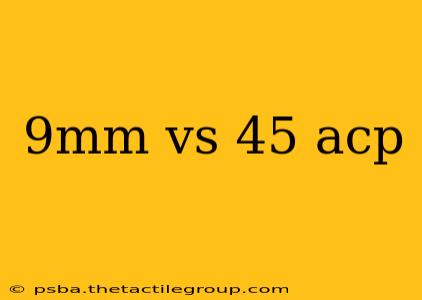Choosing between a 9mm and a .45 ACP handgun is a classic debate among firearms enthusiasts. Both calibers have ardent supporters, and the "best" choice depends heavily on individual needs and preferences. This in-depth comparison will delve into the key differences, helping you make an informed decision.
Ballistics: Power vs. Capacity
The most significant difference lies in their ballistics:
.45 ACP: The Heavyweight Champion
The .45 ACP (.45 Automatic Colt Pistol) fires a significantly larger and heavier bullet than the 9mm. This translates to greater stopping power due to higher mass and energy transfer upon impact. The larger diameter also creates a wider wound channel. Historically, the .45 ACP gained a reputation for its one-shot stopping ability, though this is a complex issue and modern research nuances this perception.
- Pros: Higher stopping power, larger wound cavity.
- Cons: Lower capacity magazines, more recoil, slower follow-up shots.
9mm: Speed and Capacity
The 9mm Parabellum boasts higher velocity and significantly greater magazine capacity. Modern 9mm ammunition offers impressive stopping power, particularly with advancements in bullet design (e.g., hollow-points). The lighter recoil allows for quicker follow-up shots, a critical advantage in self-defense situations.
- Pros: Higher magazine capacity, less recoil, faster follow-up shots, generally less expensive ammunition.
- Cons: Lower stopping power compared to .45 ACP (though modern advancements significantly mitigate this).
Recoil and Shootability
Recoil is a major factor in choosing a handgun. The substantial weight and power of the .45 ACP result in more pronounced recoil, which can be challenging for some shooters, particularly beginners. The 9mm's lighter recoil makes it easier to control, allowing for faster and more accurate follow-up shots.
- .45 ACP: Higher recoil, more challenging for new shooters.
- 9mm: Lower recoil, easier to handle and control, leading to improved accuracy.
Ammunition Cost and Availability
Generally, 9mm ammunition is more readily available and significantly cheaper than .45 ACP. This is a crucial consideration, especially for those who intend to practice regularly.
- .45 ACP: Higher cost, potentially less readily available.
- 9mm: Lower cost, readily available.
Penetration and Expansion
Both calibers offer varying levels of penetration and expansion depending on the ammunition type. Modern hollow-point bullets are designed to expand upon impact, maximizing energy transfer while minimizing over-penetration. However, .45 ACP typically offers greater penetration due to its larger mass and lower velocity (although this also depends on the specific bullet design).
Conclusion: The Verdict? It Depends.
There's no single "winner" in the 9mm vs. .45 ACP debate. The best caliber for you hinges on your individual needs and priorities.
-
Choose .45 ACP if: You prioritize stopping power above all else, you're comfortable with higher recoil, and cost is a secondary concern.
-
Choose 9mm if: You value higher capacity, less recoil, lower cost, and ease of handling. Modern 9mm ammunition offers impressive stopping power that diminishes the historical advantage of the .45 ACP.
Ultimately, the best approach is to rent or borrow both calibers to see which feels more comfortable and controllable for you. Consider your shooting experience, intended use (self-defense, target practice, etc.), and budget when making your decision. This careful consideration will ensure you choose the handgun and caliber that best meets your individual needs.

